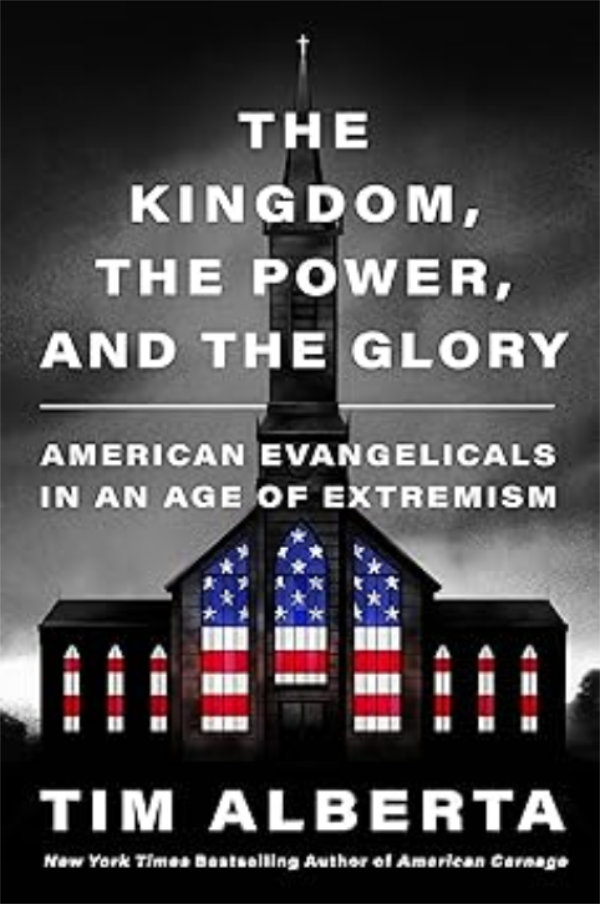Book: The Kingdom, the Power, and the Glory

A relative of mine is a practicing psychologist. Among other things, she favors trans women participating in women’s sports and affirmative care for transgender teenagers. Quite innocently, I asked her whether she had ever read the book, Irreversible Damage: The Transgender Craze Seducing Our Daughters, by Abigail Shrier. She responded by making what is conventionally called “a face.”
I think she should read the book, if only to find out firsthand what her adversaries think. As for me, I have long since tired of Dembski, Behe, Schroeder, and their ilk, not to mention Ken Ham, so I turned to The Kingdom, the Power, and the Glory, subtitled American Evangelicals in an Age of Extremism, by the veteran journalist Tim Alberta. And a splendid book it is, despite your probably justified suspicion that Alberta and I would agree on very little, theologically and possibly politically (according to his home page, Alberta worked for the National Review, Politico, and now The Atlantic, so we may be observing some evolution in action, but I could not find anything specifically concerning his political affiliation, if any).
The book concerns Christian nationalism, and how so many American evangelicals, in my reading, at least, learned to idolatrize the United States and conflate their conservative religious beliefs with conservative, even reactionary politics. Alberta gets his material by traveling around the country for approximately 4 years and interviewing countless evangelical pastors and their parishioners. Though I found the book a little long at times, I thought it worked well.
The book is written in three parts, besides a prologue and an epilogue. The three parts, not surprisingly, are The Kingdom, The Power, and The Glory. You could get almost everything you needed to know about the book from reading the epilogue, but I think you would miss a lot. The identity of The Kingdom was a little obscure to me, but probably refers to the United States, which many evangelicals have convinced themselves was founded as a Christian nation. The Power shows how many evangelical churches were taken over by a tacit conspiracy of Christian nationalists and hucksters. And the chapter on The Glory details the stories of those who have resisted or are fighting back. The biggest villain in the book, I think, was probably Jerry Falwell, Jr. Among several heroes were Chris Winans, the pastor who succeeded Alberta’s father and was practically drummed out of his own church, and Rachael Denhollander, a layperson who fought against strong opposition to expose sexual predators in the church.
The book has been out for 7 or 8 months now, and I do not want to go into detail. You may find excellent reviews in the Times, the Post, the Guardian, Christianity Today, the blog Righting America, and elsewhere.
Readers of PT may be disappointed to find that Ken Ham is not mentioned once. Rather than worry about creationists, Alberta shows how people can be swept up by a sort of herd mentality, abandon churches that preach conservative Christianity, and instead flock to churches that preach Christian nationalism, that is, conservative or evangelical Christianity married to very right-wing politics.
If you watch the PBS News Hour interview with Tim Alberta, you will discover how white Americans, who used to be in the majority, find that they are losing status and feel under siege, even though to my mind they are on the verge of a takeover even more clearly now than when the book was issued. Indeed, they are more than willing to demolish the wall between church and state, and make Christianity at least implicitly a state religion. As noted in the News Hour, they may not accept the outcome of a democratic election that they have lost.
By “Christianity,” of course, they mean “evangelical Christianity,” and I am sorry to note that throughout the book Alberta also conflates Christianity with evangelical Christianity. I was also a little bit put off by what I thought was his implicit assumption that the religion of Jesus was the Only Right One, but that could be me reading something unwarranted into the text.
